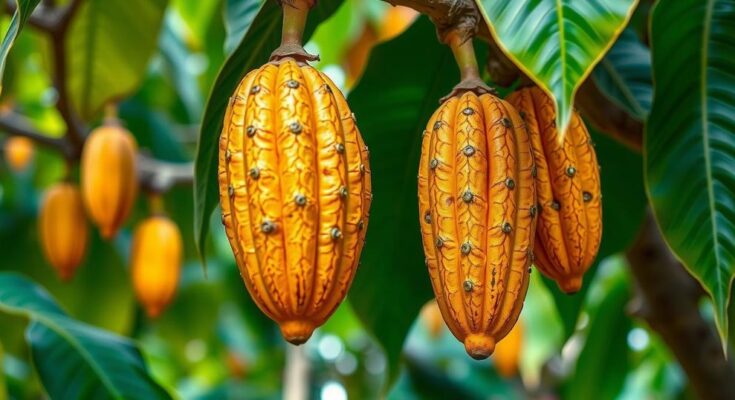Cocoa production in Ghana has decreased by nearly 50% over three years, according to Finance Minister Dr. Cassiel Ato Forson. COCOBOD’s inability to meet supply demands has led to significant financial losses, with outstanding debts and rolled-over contracts compounding the crisis. The government is committed to addressing these issues while pursuing a 24-Hour Economy policy to stimulate growth.
Ghana’s cocoa production has experienced a dramatic decline of nearly 50 percent over the past three years, as reported by Dr. Cassiel Ato Forson, the Minister of Finance. During his presentation of the 2025 Budget and Economic Policy Statement in Parliament, he emphasized that cocoa, which was once foundational to the economy, is now unable to adequately support it despite rising global market prices.
Dr. Forson indicated that the Ghana Cocoa Board (COCOBOD) would be unable to supply 330,000 tonnes of cocoa for the 2023/2024 crop season, resulting in some supply contracts being deferred to 2025. He lamented the mismanagement of the cocoa sector, which has undermined its traditional role as the backbone of the Ghanaian economy. This mismanagement, he argued, continues to persist even in the face of historically high market prices worldwide.
He highlighted the troubling financial implications, revealing that deferred contracts would incur an extra loss of $495 million in 2025. According to Dr. Forson, fulfilling the rolled-over contracts will cause COCOBOD and Ghanaian farmers to incur a loss of $4,000 for every tonne of cocoa delivered this year. Additionally, he reported that COCOBOD’s total debt has soared to GH¢32 billion, with GH¢11.92 billion due in 2025.
The Finance Minister further pointed out that outstanding cocoa road contracts have reached GH¢21 billion ($1.3 billion), with only GH¢4.4 billion accounted for in COCOBOD’s financial records. He lamented that the forward sales contracts locked in at lower prices compared to current market rates have led to an overall revenue loss of $840 million for COCOBOD and have adversely impacted local farmers.
Furthermore, he expressed concern regarding market price discrepancies and smuggling, noting that the significant gap between market prices and payments to farmers encourages illicit trade and threatens the industry’s long-term viability. Despite these challenges in critical economic sectors, Dr. Forson affirmed the government’s commitment to tackling these issues and indicated plans to introduce a 24-Hour Economy policy aimed at stimulating growth and job creation, which will be presented to Parliament soon.
In conclusion, Ghana’s cocoa sector is facing dire challenges, with production halving in the last three years due to mismanagement. The financial losses associated with deferred contracts and the rising debt of COCOBOD paint a somber picture for the future. The government’s commitment to addressing these issues through policy initiatives remains crucial for revitalizing this essential industry and safeguarding the livelihoods of cocoa farmers.
Original Source: www.ghanabusinessnews.com




